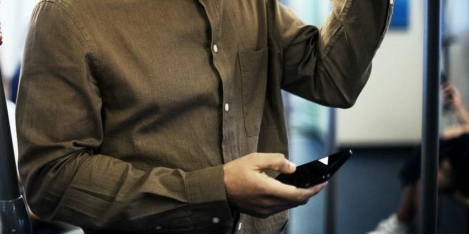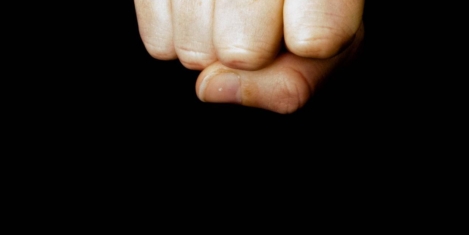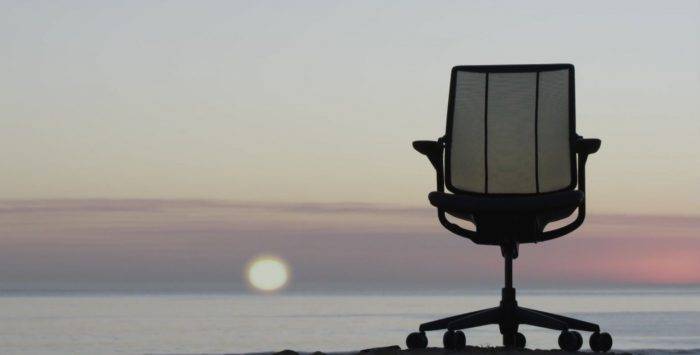May 15, 2018
People like to hold on to their smartphones even when not using them
 A large number of people walk around with their smartphones in their hands even when they are not using them, according to a new study. In the study, The Phone Walkers: A study of human dependence on inactive mobile devices, researchers Laura Schaposnik and James Unwin at the University of Illinois at Chicago studied over 3,000 adult pedestrians at six city center locations in Paris. Just over half the pedestrians were female, with an average age of about 35. Of the total adults observed, 674 were phone walkers – just over a fifth of people. The researchers noted that there were significant differences between the sexes. In total, around 20 percent of men were phone walkers, compared with 33 percent women. However, phone walking was less common in mixed couples: just 18 percent.
A large number of people walk around with their smartphones in their hands even when they are not using them, according to a new study. In the study, The Phone Walkers: A study of human dependence on inactive mobile devices, researchers Laura Schaposnik and James Unwin at the University of Illinois at Chicago studied over 3,000 adult pedestrians at six city center locations in Paris. Just over half the pedestrians were female, with an average age of about 35. Of the total adults observed, 674 were phone walkers – just over a fifth of people. The researchers noted that there were significant differences between the sexes. In total, around 20 percent of men were phone walkers, compared with 33 percent women. However, phone walking was less common in mixed couples: just 18 percent.










 UK office workers spend an alarmingly limited amount of time outdoors each day, claims new research from Ambius, which found that almost 40 percent spend a maximum of just 15 minutes outside, excluding their commute to work, and an additional 22 percent spend a maximum of 30 minutes outside. This is even less than prisoners, who require ‘at least one hour of suitable exercise in the open air daily’, according to UN guidelines. On average, the British workers surveyed spend more time per day at their desk or workstation (6.8 hours) than they do in bed (6.4 hours), relaxing at home (3.5 hours) or outdoors (37 mins). A lack of fresh air (57 percent), insufficient natural light (49 percent), and an absence of indoor plants (36 percent) were the biggest source of frustration for employees. Introducing indoor plants (49 percent), nicer artwork (50 percent), and a more interesting colour scheme (54 percent), topped the list of employees’ requests to improve their workplace.
UK office workers spend an alarmingly limited amount of time outdoors each day, claims new research from Ambius, which found that almost 40 percent spend a maximum of just 15 minutes outside, excluding their commute to work, and an additional 22 percent spend a maximum of 30 minutes outside. This is even less than prisoners, who require ‘at least one hour of suitable exercise in the open air daily’, according to UN guidelines. On average, the British workers surveyed spend more time per day at their desk or workstation (6.8 hours) than they do in bed (6.4 hours), relaxing at home (3.5 hours) or outdoors (37 mins). A lack of fresh air (57 percent), insufficient natural light (49 percent), and an absence of indoor plants (36 percent) were the biggest source of frustration for employees. Introducing indoor plants (49 percent), nicer artwork (50 percent), and a more interesting colour scheme (54 percent), topped the list of employees’ requests to improve their workplace.




 More than a quarter of managers (27 percent) in British companies would likely accept a salary cut to work for a company that has a clear purpose beyond profit a new report claims. A third (32 percent) would actually consider leaving their job if a greater purpose was unclear, while more than half (53 percent) would if their company’s values and purpose didn’t align with their own. The YouGov survey, commissioned by Danone UK, highlights the importance of having a defined company purpose that marries commercial success with social progress. The findings support a new report by not-for-profit think tank Tomorrow’s Company and Danone UK, that explores the importance of having a purpose beyond profit in helping companies to prosper in the face of workplace challenges created by an uncertain world.
More than a quarter of managers (27 percent) in British companies would likely accept a salary cut to work for a company that has a clear purpose beyond profit a new report claims. A third (32 percent) would actually consider leaving their job if a greater purpose was unclear, while more than half (53 percent) would if their company’s values and purpose didn’t align with their own. The YouGov survey, commissioned by Danone UK, highlights the importance of having a defined company purpose that marries commercial success with social progress. The findings support a new report by not-for-profit think tank Tomorrow’s Company and Danone UK, that explores the importance of having a purpose beyond profit in helping companies to prosper in the face of workplace challenges created by an uncertain world. 
 It can be proven that a well implemented Occupational Health service can offer a good return on investment, finds a new report. A white paper, produced by the Society of Occupational Medicine (SOM), the International SOS Foundation and KU Leuven University,
It can be proven that a well implemented Occupational Health service can offer a good return on investment, finds a new report. A white paper, produced by the Society of Occupational Medicine (SOM), the International SOS Foundation and KU Leuven University, 


 One in four working people aged 55+ with a health condition are considering leaving work as a negative culture and bureaucratic procedures put many off speaking to their employers until a crisis point. This is according to a new report from Ageing Better, ‘Health warning for employers: supporting older workers with health conditions’, which claims that employers are not properly supporting older workers experiencing long-term physical and mental health conditions. Health is the most important factor affecting older workers’ decisions to stop working before reaching State Pension age. Ageing Better’s research finds that early access to support, small adjustments to the workplace and working patterns, and empathetic management are crucial to enabling people to manage their health at work and remain in employment. But the research also found that workers are often put off speaking to employers until the last moment due to poor workplace culture and overly bureaucratic procedures.
One in four working people aged 55+ with a health condition are considering leaving work as a negative culture and bureaucratic procedures put many off speaking to their employers until a crisis point. This is according to a new report from Ageing Better, ‘Health warning for employers: supporting older workers with health conditions’, which claims that employers are not properly supporting older workers experiencing long-term physical and mental health conditions. Health is the most important factor affecting older workers’ decisions to stop working before reaching State Pension age. Ageing Better’s research finds that early access to support, small adjustments to the workplace and working patterns, and empathetic management are crucial to enabling people to manage their health at work and remain in employment. But the research also found that workers are often put off speaking to employers until the last moment due to poor workplace culture and overly bureaucratic procedures.















May 2, 2018
The quest for wellbeing has taken over from our search for productivity
by Mark Eltringham • Comment, Wellbeing, Workplace design
More →